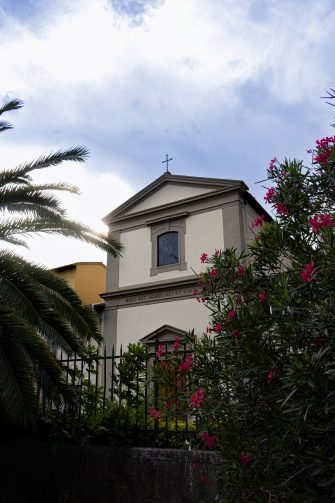Convent of the Bettine – A corner of spirituality and history in Campi Bisenzio
In the heart of the Metropolitan City of Florence, nestled in the green Tuscan countryside, stands the Convent of the Bettine, a place rich in history and peaceful atmosphere. Built between 1885 and 1887, the convent represents an important cultural and religious heritage, witness to a past of social and spiritual commitment.
The History of the Convent and Its Foundress
Teresa Maria of the Cross was born in 1846 in San Martino, now part of Campi Bisenzio. The daughter of Gaetano, a poulterer, and Rosa Bigagli, she grew up in an environment marked by economic difficulties, accentuated by the untimely death of her father. Her vocation manifested itself in 1865, after an accident that forced her into a long bed rest, during which she had a vision that prompted her to devote herself to others. In 1874, together with two friends, she founded a small religious community in the house known as the “Conventino,” located under the embankment of the Bisenzio River. Her initiative soon attracted new vocations and supporters, leading to the growth of a movement also engaged in charitable works, particularly in the education of young girls and the care of abandoned girls. These efforts led to the subsequent expansion of the work to Syria and Palestine as well.
The Founding of the Convent
The congregation’s expansion required a larger and more stable location, leading in 1885 to the construction of the Bettine Convent, which housed the religious community permanently. A church was also built next to the main building, solving a historical problem related to the detour of the course of the Bisenzio River in 1328, which had made religious participation in the hamlet of San Martino difficult. The new church became a landmark for the local community, fostering meetings and moments of gathering.
The Legacy and Social Commitment
In 1904, the Carmelite Sisters of St. Teresa gained official approval and in the following years opened branches abroad, with missions in Syria, Palestine, Lebanon and Brazil. Bettina’s life came to an end in 1910, but her work and ideals lived on through the activities of her sisters and the cultural legacy left to the community. Today, the church and convent are spaces for culture and reflection, testaments to a past of commitment and shared values.
The Convent Today
Today the Bettine Convent represents an important historical and cultural heritage of Campi Bisenzio. Its architecture, gardens and interiors invite visitors to discover a place of serenity and memory, where past and present come together in an experience of discovery and reflection on the local history and traditions of the region. It is a reference point for those who wish to learn more about the cultural roots of this part of Tuscany.
Come and discover this corner of history and tradition. The Bettine Convent welcomes you for an experience of culture, peace and spirituality.









